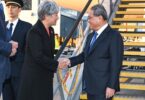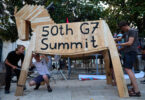In the annals of contemporary geopolitics, the ongoing conflict involving Russia has reached a critical juncture. The toll it has taken on innocent lives and the stability of international relations cannot be overstated. Amidst the clamorous calls for further isolation of Russia, it is imperative to acknowledge that such a strategy is neither feasible nor constructive. Russia, by virtue of its vast expanse, abundant natural resources, and formidable alliances with nations like China and India, remains an integral player on the world stage. Instead of fixating on the dismantlement of Russia, global leaders must pivot towards fostering peace-a solution that promises enduring stability and prosperity for all.
To begin with, the sheer size and strategic importance of Russia make its isolation an impractical endeavor. Spanning eleven time zones and possessing a diverse array of climates and terrains, Russia is not merely a country; it is a continent unto itself. This geographic enormity is matched by its wealth of natural resources, from vast reserves of oil and natural gas to significant deposits of minerals and timber. These resources are not only vital to the Russian economy but also to the global supply chain. Isolating Russia would, therefore, have far-reaching repercussions, disrupting global markets and affecting economies worldwide.
Moreover, Russia’s alliances with China and India further complicate the notion of isolation. China, as the world’s second-largest economy, shares a robust strategic partnership with Russia, marked by mutual economic and military cooperation. India, too, maintains a complex relationship with Russia, balancing its historical ties with contemporary geopolitical considerations. These alliances underscore a crucial reality: Russia is deeply intertwined with the global community. Any attempt to isolate it would not only strain these critical relationships but also destabilize the broader international order.
The ongoing conflict, with its devastating human toll, demands a shift in focus from isolation to peacebuilding. The war has dragged on for far too long, claiming the lives of countless innocent people and sowing seeds of enmity that could take generations to uproot. It is incumbent upon world leaders to steer the discourse towards reconciliation and diplomacy. The incessant pursuit of punitive measures against Russia is a path fraught with peril, one that risks exacerbating tensions and prolonging the suffering of the people caught in the crossfire.
Russian President Vladimir Putin, too, must come to terms with the futility of war mongering. The relentless pursuit of territorial ambitions will not reverse the tide of history. The territories that once formed part of the Russian Empire and later the Soviet Union have charted their own courses, emerging as independent nations with their unique identities and aspirations. Clinging to irredentist fantasies will not alter this reality; it will only perpetuate conflict and instability.
The path forward lies in embracing the principles of sovereignty and self-determination. Nations have the right to define their destinies free from external coercion. This tenet forms the bedrock of international law and order. For Russia, recognizing and respecting the sovereignty of its neighbors is not a concession of weakness but a demonstration of strength and wisdom. It is a step towards healing the wounds of the past and building a future grounded in mutual respect and cooperation.
For global leaders, the onus is on fostering an environment conducive to peace. This involves not only diplomatic engagement with Russia but also addressing the underlying issues that fuel conflicts. Economic disparities, political grievances, and security concerns must be addressed through comprehensive and inclusive dialogue. Sanctions and isolation, while they may serve as immediate punitive measures, do not provide a sustainable solution. They often entrench positions and harden attitudes, making reconciliation more elusive.
The international community must also bolster mechanisms for conflict resolution and peacebuilding. Institutions like the United Nations must be empowered to play a more proactive role in mediating disputes and facilitating negotiations. Regional organizations, too, have a vital part to play in fostering dialogue and cooperation among neighboring states. By strengthening these institutions, the world can create a more resilient framework for managing conflicts and preventing future wars.
The isolation of Russia is neither a viable nor a desirable strategy. Given its geographic, economic, and geopolitical significance, Russia cannot be cast into international oblivion. Instead, the focus must shift towards peace and diplomacy. The protracted conflict has already exacted a heavy toll on human lives and international stability. It is time for world leaders to prioritize peace over punishment, dialogue over discord. Only through collective efforts aimed at reconciliation and cooperation can a durable and just peace be achieved.







